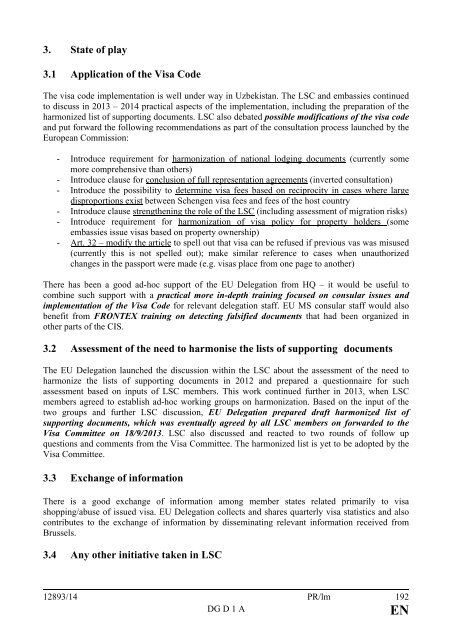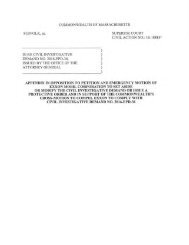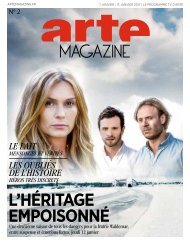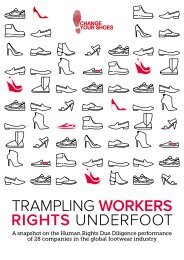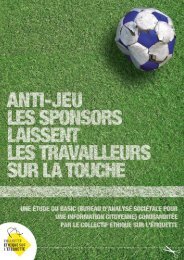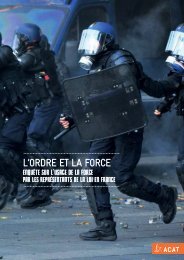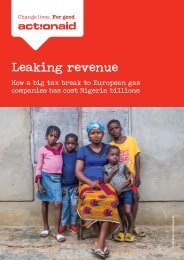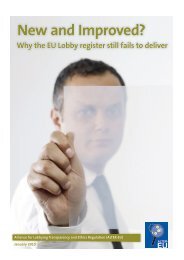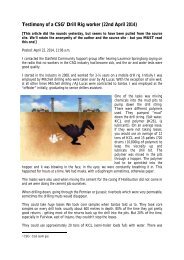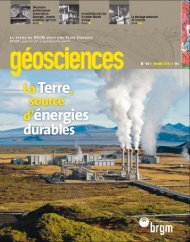eu-com-schengen-coop
eu-com-schengen-coop
eu-com-schengen-coop
You also want an ePaper? Increase the reach of your titles
YUMPU automatically turns print PDFs into web optimized ePapers that Google loves.
3. State of play<br />
3.1 Application of the Visa Code<br />
The visa code implementation is well under way in Uzbekistan. The LSC and embassies continued<br />
to discuss in 2013 – 2014 practical aspects of the implementation, including the preparation of the<br />
harmonized list of supporting documents. LSC also debated possible modifications of the visa code<br />
and put forward the following re<strong>com</strong>mendations as part of the consultation process launched by the<br />
European Commission:<br />
- Introduce requirement for harmonization of national lodging documents (currently some<br />
more <strong>com</strong>prehensive than others)<br />
- Introduce clause for conclusion of full representation agreements (inverted consultation)<br />
- Introduce the possibility to determine visa fees based on reciprocity in cases where large<br />
disproportions exist between Schengen visa fees and fees of the host country<br />
- Introduce clause strengthening the role of the LSC (including assessment of migration risks)<br />
- Introduce requirement for harmonization of visa policy for property holders (some<br />
embassies issue visas based on property ownership)<br />
- Art. 32 – modify the article to spell out that visa can be refused if previous vas was misused<br />
(currently this is not spelled out); make similar reference to cases when unauthorized<br />
changes in the passport were made (e.g. visas place from one page to another)<br />
There has been a good ad-hoc support of the EU Delegation from HQ – it would be useful to<br />
<strong>com</strong>bine such support with a practical more in-depth training focused on consular issues and<br />
implementation of the Visa Code for relevant delegation staff. EU MS consular staff would also<br />
benefit from FRONTEX training on detecting falsified documents that had been organized in<br />
other parts of the CIS.<br />
3.2 Assessment of the need to harmonise the lists of supporting documents<br />
The EU Delegation launched the discussion within the LSC about the assessment of the need to<br />
harmonize the lists of supporting documents in 2012 and prepared a questionnaire for such<br />
assessment based on inputs of LSC members. This work continued further in 2013, when LSC<br />
members agreed to establish ad-hoc working groups on harmonization. Based on the input of the<br />
two groups and further LSC discussion, EU Delegation prepared draft harmonized list of<br />
supporting documents, which was eventually agreed by all LSC members on forwarded to the<br />
Visa Committee on 18/9/2013. LSC also discussed and reacted to two rounds of follow up<br />
questions and <strong>com</strong>ments from the Visa Committee. The harmonized list is yet to be adopted by the<br />
Visa Committee.<br />
3.3 Exchange of information<br />
There is a good exchange of information among member states related primarily to visa<br />
shopping/abuse of issued visa. EU Delegation collects and shares quarterly visa statistics and also<br />
contributes to the exchange of information by disseminating relevant information received from<br />
Brussels.<br />
3.4 Any other initiative taken in LSC<br />
12893/14 PR/lm 192<br />
DG D 1 A<br />
EN


